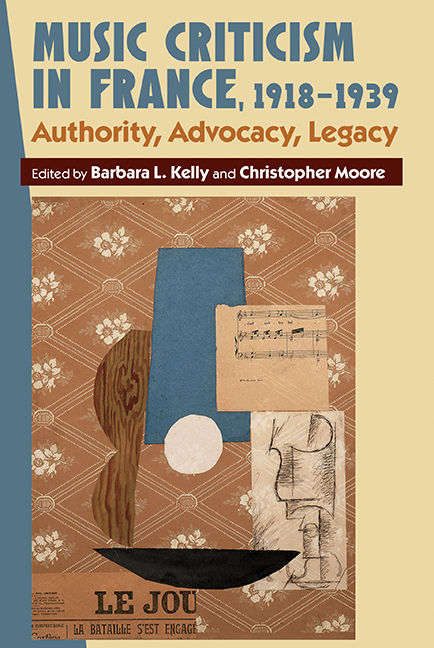Book contents
- Frontmatter
- Contents
- List of Figures
- List of Tables
- List of Contributors
- Acknowledgements
- Introduction: The Role of Criticism in Interwar Musical Culture
- 1 Music Criticism and Aesthetics During the Interwar Period: Fewer Crimes and More Punishments
- 2 Nostalgia and Violence in the Music Criticism of L'Action française
- 3 Charles Koechlin: The Figure of the Expert
- 4 Bleu-horizon Politics and Music for Radio Listeners: L'Initiation à la musique (1935)
- 5 Common Canon, Conflicting Ideologies: Music Criticism in Performance in Interwar France
- 6 Arthur Honegger: Music Critic for Musique et Théâtre (1925–1926)
- 7 A Woman's Critical Voice: Nadia Boulanger and Le Monde musical, 1919–1923
- 8 From a Foreign Correspondent: The Parisian Chronicles of Alejo Carpentier
- 9 Debussy's ‘Reputational Entrepreneurs’: Vuillermoz, Koechlin, Laloy and Vallas
- 10 The Legacy of War: Conceptualising Wartime Musical Life in the Post-War Musical Press, 1919–1920
- 11 Satie, Relâche and the Critics: Controversies and Legacy
- 12 Creating a Canon: émile Vuillermoz's Musiques d'aujourd'hui and French Musical Modernity
- Selected Bibliography
- Index
11 - Satie, Relâche and the Critics: Controversies and Legacy
Published online by Cambridge University Press: 17 July 2019
- Frontmatter
- Contents
- List of Figures
- List of Tables
- List of Contributors
- Acknowledgements
- Introduction: The Role of Criticism in Interwar Musical Culture
- 1 Music Criticism and Aesthetics During the Interwar Period: Fewer Crimes and More Punishments
- 2 Nostalgia and Violence in the Music Criticism of L'Action française
- 3 Charles Koechlin: The Figure of the Expert
- 4 Bleu-horizon Politics and Music for Radio Listeners: L'Initiation à la musique (1935)
- 5 Common Canon, Conflicting Ideologies: Music Criticism in Performance in Interwar France
- 6 Arthur Honegger: Music Critic for Musique et Théâtre (1925–1926)
- 7 A Woman's Critical Voice: Nadia Boulanger and Le Monde musical, 1919–1923
- 8 From a Foreign Correspondent: The Parisian Chronicles of Alejo Carpentier
- 9 Debussy's ‘Reputational Entrepreneurs’: Vuillermoz, Koechlin, Laloy and Vallas
- 10 The Legacy of War: Conceptualising Wartime Musical Life in the Post-War Musical Press, 1919–1920
- 11 Satie, Relâche and the Critics: Controversies and Legacy
- 12 Creating a Canon: émile Vuillermoz's Musiques d'aujourd'hui and French Musical Modernity
- Selected Bibliography
- Index
Summary
Now what do you say about Relâche itself? It is perpetual motion, life, the minute when we all try to be happy. It is light, wealth, luxury. It is love far from the conventions of modesty – without morality for the stupid or artistic affectation for the snobs. Relâche is as much alcohol and opium as sports, strength, and health. It is baccarat or mathematics.
Relâche is the optimism of happy people. In it, you will see a very beautiful woman, a very beautiful man, many beautiful men, and dazzling lights, all advancing in as fast and pleasant a motion as a 300 horse power car could give us on the best road lined with trees inclined by the illusions that speed gives.
Relâche is black and white, night and day, day and night.
Relâche, I hope, will go on in life like a beautiful woman who dares to show the most beautiful legs in the finest silk stockings, walking arm in arm with the most attractive athlete!
This is the kind of advertising text that Francis Picabia published before the première of Relâche, an ‘instantaneous’ ballet in two acts (Ballet instantanéiste en deux actes) with an intermission containing a film (Entr'acte cinématographique), and a finale entitled ‘The Tail of the Dog’ (‘La Queue du chien’). In light of these most preposterous and provocative lines, it was expected that this production by Picabia, Erik Satie and René Clair would be outrageous and align itself with Dadaist aesthetics for which derision had become a matter of principle.
‘Wear dark glasses and bring something with which to plug your ears’, announced the advertisement that appeared in the periodical 391 a month before the première in a special issue devoted to Picabia's ‘Journal de l'instantanéisme’. On the title page of the latter Picabia defined instantaneism with recourse to ideological slogans designed to grab the attention of the reader:
Instantaneism: does not want yesterday.
Instantaneism: does not want tomorrow.
[…]
Instantaneism: only believes in today.
Instantaneism: wants freedom for all.
Instantaneism: only believes in life.
Instantaneism: only believes in perpetual motion.
The notion of ‘today’, understood as ‘here and now’, is fundamental to defining instantaneism. For Picabia, ‘the instantaneist does not seek out his roots in the past or in the unconscious’, he only believes in the present instant, composed of a series of unexpected images that are simultaneously present.
- Type
- Chapter
- Information
- Music Criticism in France, 1918–1939Authority, Advocacy, Legacy, pp. 267 - 292Publisher: Boydell & BrewerPrint publication year: 2018



